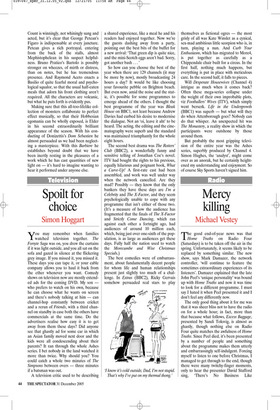Spoilt for choice
Simon Hoggart
You may remember when families watched television together. The Forsyte Saga was on, you drew the curtains if it was light outside, and you all sat on the sofa and gazed in silence at the flickering grey image. If you missed it, you missed it. These days you can tape it, or your cable company allows you to haul it back from the ether whenever you want. Comedy shows on television now are mostly extended ads for the coming DVD. My son who prefers to watch on his own, because he can choose what he wants on screen and there’s nobody talking at him — can channel-hop constantly between cricket and a rerun of Friends, with a third channel on standby in case both the others have commercials at the same time. Do the advertisers realise how easy it is to get away from them these days? Did anyone see that ghastly ad for some car in which an Asian family moved next door and the kids were all condescending about their parents? It ran through the whole Ashes series. I bet nobody in the land watched it more than twice. Why should you? You could catch a whole two minutes of The Simpsons between overs — three minutes if a batsman was out.
A television critic used to be describing a shared experience, like a meal he and his readers had enjoyed together. Now we’re the guests dashing away from a party, pointing out the best bits of the buffet for a new arrival: ‘That green dip is quite nice, and the mini-Scotch eggs aren’t bad. Sorry, got another bash ... ’ So how can you choose the best of the year when there are 129 channels (it may be more by now), mostly broadcasting 24 hours a day? It would be like choosing your favourite pebble on Brighton beach. But even now, amid the noise and the static, it’s possible for some programmes to emerge ahead of the others. I thought the best programme of the year was Bleak House on BBC1, not least because Andrew Davies had curbed his desire to modernise the dialogue. Not an ‘oi, leave it aht’ to be heard. The acting, the editing and the cinematography were superb and the standard was maintained triumphantly for the whole eight hours.
The second best drama was The Rotters’ Club (BBC2), a wonderfully funny and sensitive telling of Jonathan Coe’s novel. ITV had bought the rights to his previous, equally hilarious and poignant book, What a Carve-Up! A first-rate cast had been assembled, and work was well under way when the network cancelled. Are they mad? Possibly — they know that the only bankers they have these days are I’m a Celebrity and The X-Factor, and they seem psychologically unable to cope with any programme that isn’t either of those two. (It’s a measure of how the audience has fragmented that the finals of The X-Factor and Strictly Come Dancing, which ran against each other a fortnight ago, had audiences of around 10 million each, which, being just over one-sixth of the population, is as large as audiences get these days. Fully half the nation used to watch the Morecambe and Wise Christmas Specials.) The best comedies were of embarrassment, about fundamentally decent people for whom life and human relationships present just slightly too much of a challenge. In Extras (BBC2), Ricky Gervais somehow persuaded real stars to play themselves as fictional ogres — the most grisly of all was Kate Winslet as a cynical, sex-mad ambitious little scorpion who is, in turn, playing a nun. And Curb Your Enthusiasm, which has migrated to More4, is put together as carefully as a Chippendale chair built for a circus. In the first half, nothing much happens, but everything is put in place with meticulous care. In the second half, it falls to pieces.
Will Desperate Housewives (Channel 4) intrigue as much when it comes back? Often these mega-series collapse under the weight of their own improbable plots, viz Footballers’ Wives (ITV), which simply went berserk. Life in the Undergrowth (BBC1) was superb — but what will they do when Attenborough goes? Nobody can do that whisper. An unexpected hit was The Monastery, a reality show in which the participants were outshone by those around them.
But probably the most gripping television of the entire year was the Ashes series, superbly produced by Channel 4. Simon Hughes, the ‘analyst’, might come over as an anorak, but he certainly heightened my understanding and enjoyment. So of course Sky Sports haven’t signed him.

















































 Previous page
Previous page